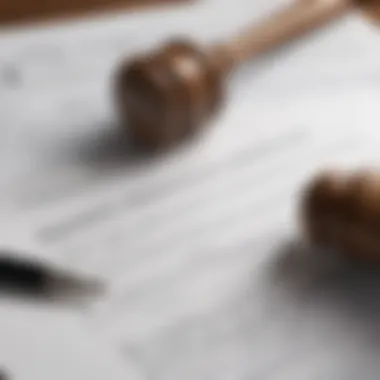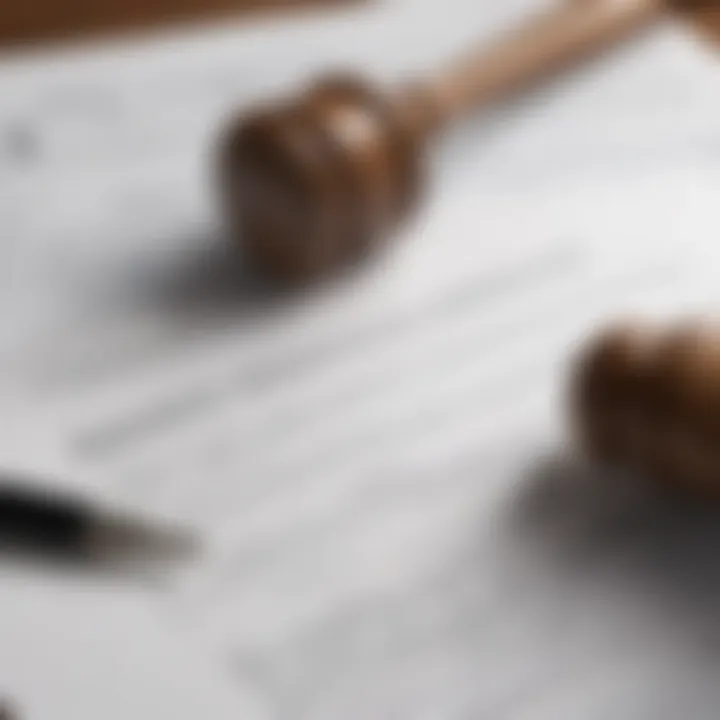Crafting Your Own Will: A Comprehensive Guide


Intro
Creating a will is an essential step in the estate planning process. It's about making choices for the future when one may no longer be around to make those decisions. Many individuals might shy away from this task due to its complexity or misconceptions about its necessity. However, taking the time to understand and draft your own will can save both time and resources.
This guide aims to demystify the will-writing process. It will cover key legal aspects, the required components of a will, and practical tips to ensure that your desires are properly documented. In addition, the advantages and disadvantages of self-drafting versus enlisting the help of a professional will be examined.
When you write a will, you effectively hold the pen that outlines your wishes for distribution of your assets. This document serves as your voice in ensuring that your loved ones are cared for after your passing.
Understanding these nuances will empower you to take control of what happens to your possessions and help secure peace of mind for your family. To start off, let’s delve into important terms and concepts that will frame our conversation about drafting a will.
Understanding the Importance of a Will
Creating a will is an act that often goes overlooked, with many people believing it's something only the elderly or affluent will need to consider. Yet, as life unfolds with its unpredictability, having a will becomes as essential as having a good plan for a road trip— you wouldn't hit the road without a map, would you? The importance of a will is not merely about dictating who gets what after you’re gone, but about laying down a clear path for your loved ones during what can already be a tumultuous time.
Defining a Will and Its Functions
At its core, a will is a legal document that outlines how your assets, debts, and responsibilities should be managed after your death. Think of it as a personalized instruction manual for your estate. However, its functions extend beyond just asset distribution.
- Establishes Guardianship: For those with children, a will can designate guardians, ensuring that your minor dependents are cared for by the individuals you trust most.
- Honoring Specific Wishes: Whether it’s that vintage guitar you promised to your buddy or the family heirloom, a will can make sure your specific wishes are honored, preventing any family disputes.
- Reduce Uncertainty: A clearly articulated will can help mitigate confusion among family and friends, guiding them during a period of grief without the added stress of estate squabbles.
Thus, the will acts as both a map and a peacekeeper within the potentially muddy waters of estate handling.
Why Everyone Should Have a Will
Here lies the paradox of the will; it is simultaneously a simple yet profoundly significant document. The necessity of having a will arises from several compelling reasons that resonate with everyone, regardless of wealth or age.
- Protection for Loved Ones: A will protects your loved ones from default state laws that dictate how your assets will be distributed. Without a will, your local laws take charge, which may not align with your personal wishes.
- Avoiding Lengthy Probate Process: If a will is properly constructed and executed, it helps streamline the probate process, reducing delays and ensuring your assets are allocated efficiently.
- A Sense of Control: Writing a will provides individuals with the opportunity to maintain control over their legacy. It’s a chance to express personal values and provide guidance on matters that go beyond financial wealth.
"A will is not just for the rich; it’s the ultimate form of personal agency."
Assessing Your Situation
Assessing your situation is a crucial step in the process of creating your own will. Poorly defined or misunderstood circumstances can lead to misallocated assets and disputes amongst your heirs. Knowing the lay of the land helps ensure that your wishes are carried out smoothly after your passing. In essence, it lays the groundwork for the rest of your will, and it is worth taking time to get it right.
Evaluating Your Assets and Liabilities
When you think about preparing a will, diving into your personal finances might not be the first thing that comes to mind, but it’s the cornerstone of the process. Getting a clear picture of what you own and what you owe can save you a mountain of troubles later on.
Start with a comprehensive inventory of your assets. This could include:
- Real Estate: Homes, vacation properties, or land you own.
- Vehicles: Cars, motorcycles, boats, etc.
- Financial Accounts: Bank accounts, investment portfolios, retirement savings.
- Personal Property: Jewelry, collectibles, art, and other valuable items.
Once you've tallied your assets, it's essential to unpack your liabilities as well. Understanding what you owe will help you gauge the net value of your estate. Liabilities can involve:
- Mortgages on real estate.
- Loans such as personal loans or student debt.
- Credit Card Debt.
A stark realization of your financial standing can inform your decisions about how to distribute your assets, keeping in mind that debts need to be settled before anything can be passed on to heirs. No one wants to leave behind a financial mess.
Understanding Your Dependents
Another critical element in this process is to fully grasp the needs and situations of those who depend on you. This is more than just a census of who, but also understanding the dynamics and requirements that could play a role in how you draft your will.
Think about:
- Children: If you have kids, who will take care of them? Have you thought about a guardian? This is often a wisdom-heavy decision that requires a discussion with potential candidates.
- Spouse or Partner: How will the distribution of your assets affect your spouse? Will they need support for a specific lifestyle?
- Other Dependents: This could be aging parents or siblings that depend on your assistance.
By evaluating both your assets and the people reliant on you, you'll be laying a strong foundation for your will. This thoughtful approach minimizes conflicts and aims to make the later stages of asset distribution as seamless as possible.
"A well-thought-out will protects not just your assets but your loved ones' future as well."
Understanding your situation is a critical building block in crafting your will effectively. With a deep dive into your financial landscape and understanding your family needs, you can move forward with clarity and purpose.
Legal Framework Surrounding Wills
The legal framework of wills is akin to the scaffolding of a building; it provides necessary support and structure to ensure that the final product is strong and stands the test of time. Understanding this framework is truly vital when crafting your own will. It allows individuals to navigate the complexities inherent in estate planning, ensuring that their intentions are upheld after they are gone. This section illuminates various state-specific laws governing wills and what constitutes a valid will.
State-Specific Laws
Each state in the U.S. has different laws that shape how wills are created and executed. What's acceptable in one state may be a no-go in another. This patchwork of regulations can throw a wrench in the works if not taken into account.


- Formality and Execution Requirements: Some states may require a will to be in writing and signed by the testator—essentially the person making the will—while others might allow oral wills under certain conditions.
- Witness Requirements: To ensure authenticity, numerous states mandate a specific number of witnesses. States like California require two witnesses, while others might have different stipulations.
- Holographic Wills: Many jurisdictions recognize holographic wills, which are handwritten and signed by the testator without the requirement of witnesses. However, the acceptance of these documents varies dramatically from one place to another.
It’s crucial to do your homework and consult local laws or legal professionals to guarantee compliance. A lapse in understanding these nuances could lead to disputes or, worse, the invalidation of a will altogether.
What Constitutes a Valid Will
Crafting a will isn't as simple as putting words on paper; certain legal standards must be met to ensure its validity. A will is viewed as a legal document that must adhere to specified criteria, which often include the following:
- Capacity: The individual must possess the mental ability to understand the implications of creating a will. This means being of sound mind when preparing the document.
- Intent: The testator must clearly express the intention to create a will. Vague statements can muddle things up, leading to family feuds over what you really meant.
- Formalities: As mentioned earlier, there are formal signing requirements. Not meeting these can transform your will from a strong pillar to mere ashes in the wind.
"A will helps eliminate uncertainty. The clearer you are in documenting your wishes, the less likely it is that disputes will arise among your loved ones."
In short, adhering to the specific requirements dictates how your wishes are legislated after you pass on. Without due diligence, a will may not fulfill its intended purpose. This piece of knowledge can be the difference between ensuring your assets are distributed according to your wishes or leaving your heirs in a legal quandary.
DIY Will Preparation: Step by Step
Creating a will by yourself is not just a task; it’s an act of taking control over your future and your legacy. This guide aims to provide a structured path to help you navigate the complexities of drafting a will. By preparing your own will, you can bypass the often heavy fees from legal professionals and ensure that your final wishes are documented according to your preferences.
Nevertheless, while doing it yourself can save money, there are important elements to consider. Understanding each step can clarify the process, reducing the chance of mistakes that could invalidate your will or lead to disputes among your family members. In this section, we’ll break down the essential components of DIY will preparation, making it easier for you to grasp what needs to be done.
Gathering Necessary Information
Before putting pen to paper, or fingers to keyboard, it's crucial to gather all relevant information. You’ll need a clear picture of what your estate comprises and who you want to benefit from your will. Start by listing your assets. This can include:
- Real estate (homes, land)
- Financial accounts (bank accounts, investment accounts)
- Personal property (vehicles, jewelry, collectibles)
- Digital assets (social media accounts, domain names)
Don’t forget about your liabilities too. Understanding what you owe can help determine what portion of your estate is genuinely available for distribution. After that, consider your beneficiaries – who should receive what? Ensure you have their full names and contact details ready. Such careful preparation provides a solid base for drafting your will.
Choosing the Right Format
Next up is choosing the right format for your will. There are generally two main formats you might consider:
- Formal written will: This is a typed or handwritten document that is usually more detailed and adheres to state requirements. It includes various provisions like naming executors and specifying bequests.
- Holographic will: This is a will that is written entirely in your handwriting and typically doesn't require witnesses. However, it can be valid in some jurisdictions as long as it meets local laws.
Each format has its pros and cons. A formal will is less likely to raise questions about validity, while a holographic will can be a quicker solution. Regardless of your choice, make sure it reflects your intentions clearly and confirms to your state's regulations.
Drafting the Will
When it’s finally time to draft the will, keep clarity and precision at the forefront of your mind. Start with an introductory statement that clearly states the document's purpose - you might say, "This is my last will and testament." Next, identify yourself and revoke any previous wills to avoid confusion.
Here’s a quick checklist to consider while drafting:
- Naming an executor: Choose someone trustworthy to manage your estate's distribution according to your wishes. This person will bridge the gap between your desires and the legal process.
- Detailing specific bequests: If certain items go to specific people, detail this clearly (e.g., "I leave my vintage watch to my brother John."). Doing this helps avoid family disputes.
- Residual clause: This leaves any remaining assets not explicitly mentioned in your will to a specified beneficiary or a group of people.
As you draft, be clear and precise. Ambiguities could lead to different interpretations, potentially causing family friction. Always review the document, and consider getting someone else to read it too. A fresh set of eyes might catch something you overlooked.
The purpose of a will is not just paperwork; it's part of securing your legacy and ensuring your loved ones are taken care of according to your wishes.
Understanding Key Components
Understanding the key components of a will is central to effective estate planning. These aspects give clarity and structure to how your wishes will be interpreted and executed after your passing. Delving into these components isn't just about compliance with legal frameworks; it's about ensuring your assets and intentions are handled as you desire. Without a well-structured will, even the most straightforward wishes can become tangled in legal disputes or ignored altogether.
Executors and Guardians
The role of an executor is fundamental in the realm of wills. This person, often referred to as the personal representative, is charged with fulfilling the terms of the will. Choosing the right executor requires careful consideration—this person needs to be trustworthy, organized, and willing to handle responsibilities that could span months or even years. Meddling in intimate affairs of a deceased person can be delicate and, at times, contentious.
Moreover, appointing a guardian for minor children is equally critical. If tragically something happens to both parents, naming a guardian helps steer clear of ambiguities that could lead to family feuds. It is advisable to have a conversation with the intended guardian beforehand to ensure they are agreeable to the role.
In a broader sense, the executor and guardian are key players in the implementation of your estate plan. They provide a sense of stability during a tumultuous time and make sure that your decisions are respected. It's important to put thought into these choices and perhaps even consult trusted friends or family members for their opinions.
Specific Bequests
Specific bequests are the explicit instructions for distributing certain items or assets. These can range from tangible items, like jewelry or a cherished heirloom, to monetary gifts designated for particular individuals or organizations. For instance, you might say, "I leave my grandfather's watch to my eldest son," which leaves very little room for interpretation.
Designating specific bequests can also minimize potential conflict among heirs. If someone knows they are receiving a particular item or amount of money, they are less likely to challenge the will or dispute over the distribution of assets. However, you need to be cautious not to over-promise; if your estate does not have enough value to cover every specific bequest, it could create discord or even force certain heirs to forgo receiving anything at all.
Residual Clauses
Residual clauses deal with the portion of an estate that remains after all debts, expenses, and specific bequests have been fulfilled. This means that whatever is left over—be it bank accounts, real estate, or any other assets—will be distributed according to the terms outlined in the residual clause.
Including a residual clause ensures that nothing falls through the cracks. If you don’t allocate residual assets, they might end up going to the state by default. This is not just a footnote but a central pillar of a properly crafted will. It allows you to dictate the fate of your estate's remaining assets, thus avoiding any uncertainties or conflicts. Think of it as the final word on your estate distribution.


In summary, understanding these key components allows you to craft a will that truly reflects your wishes and protects your loved ones from unnecessary disputes. By thoughtfully considering the roles of executors, making specific bequests, and utilizing residual clauses, you are setting the stage for an efficient and respectful handling of your estate after your passing.
Common Mistakes to Avoid
When it comes to writing your own will, neglecting to address common pitfalls can lead to complications that overshadow any initial intentions. Crafting a valid will isn't merely a matter of penning down your wishes. It requires careful attention to detail, as well as understanding the legal framework surrounding these documents. Missteps in this process could potentially invalidate your will or put your heirs in confusing situations. Understanding these mistakes is key for anyone looking to take control of their estate planning.
Insufficient Detailing
One of the most frequent snafus individuals encounter while drafting their will is insufficient detailing of their assets and how they wish to distribute them. Too often, people assume that a simple list of items suffices. Unfortunately, ambiguity leads to disputes among survivors. A lack of clarity may result in family members fighting over what was intended, creating rifts that may never heal.
To prevent this from happening, consider the following points:
- Describe Assets Clearly: Instead of simply stating "my car," specify the make, model, and year. This eliminates confusion about which item you meant.
- Specific Instructions: Detail any specific wishes you have regarding your assets. For example, state who gets the family home and under what conditions.
- Contingency Plans: Always have a fallback plan by considering scenarios where your primary beneficiary is unable to inherit.
It is best practice to take your time when detailing everything. The more information you provide, the smoother the process is likely to be after you're gone.
Improper Witnessing and Signing
Another critical error that can compromise a will is improper witnessing and signing. State laws typically require certain formalities to be adhered to for a will to be considered valid. These can range from how many witnesses are needed to whether or not you must sign in specific locations. Ignoring these requirements might render your painstakingly drafted will moot.
Keep in mind these essential factors:
- Witness Requirements: Make sure you know how many witnesses are needed in your jurisdiction. Usually, two witnesses are required, but some states have different rules.
- Witness Eligibility: Your witnesses should not be beneficiaries of the will, as their involvement could result in claims of conflict of interest.
- Signing Formalities: Ensure you're signing the document in front of your witnesses and that they are doing the same. This should happen in real time to avoid issues down the line.
"Neglecting proper witnessing and signing can unravel all efforts made in crafting a will, transforming wishes into mere aspirations."
By adhering to these guidelines, you mitigate risks and ensure that your will stands up to potential scrutiny. Taking these matters seriously may feel tedious, but establishing a solid foundation for your will is crucial for protecting your legacy and ensuring your intentions are honored.
After the Will is Written
Once the will is penned down, the real tasks begin. Many people think that once they’ve signed on the dotted line, they can just kick back and let it be. However, crafting a will is not the end of the journey; it’s merely the beginning of ensuring that your final wishes are honored and properly enacted. The importance of understanding the steps to take after drafting your will cannot be overstated.
Properly storing it and communicating with those who need to know about it are pivotal actions. Failing to do so can lead to unnecessary complications, disputes among heirs, or, in some cases, the will never being found when it's needed. Without a doubt, this phase is just as crucial as writing the will itself. As the saying goes, "A plan is only as good as its execution."
In short, it’s essential to be proactive about your will post-drafting to smoothen the process when the time comes.
Storing Your Will Safely
Safe storage stands as one of the first priorities after completing your will. You’ve put in the effort to detail your wishes, and now you need to safeguard that document. Ideally, it should be stored in a secure location where it won’t be lost or destroyed. This could be:
- A safety deposit box: Usually offered by banks, these boxes provide a high level of security.
- A fireproof safe at home: This ensures easy access while also mitigating the risk of damage.
- With an attorney: If you've consulted with a lawyer, they often will keep your will on file.
Regardless of the option you choose, ensure that the location is known to your executor or trusted family member. This little act can avoid potentially painful searches and stress during a challenging time.
Informing Relevant Parties
Once your will is safely tucked away, it’s equally crucial to inform the relevant parties. This doesn’t just mean telling your executor the whereabouts of the document, but it extends to close family members or dependents, as well.
Consider sharing the following information:
- Who your executor is
- The location of the will
- Any specific wishes, especially if they might be seen as contentious or surprising.
Communicating these details can prevent confusion or misunderstandings later on. One might think discussing end-of-life wishes is morbid, but considering the clarity this brings, the topic deserves a candid conversation.
To sum up, these two steps serve as a safeguard against future troubles. By storing your will securely and keeping relevant parties informed, you're not just asserting control over your estate; you are also reducing heart-wrenching disputes. Estate planning is as much about ensuring peace of mind for yourself as it is for your loved ones.
Updating Your Will
Updating your will is not just a formality; it’s a crucial aspect of responsible estate planning. Life is a whirlwind of changes, and staying on top of these shifts is essential for ensuring that your last wishes accurately reflect your current reality. This section delves deep into why regularly updating your will is necessary, focusing on recognizing life changes and establishing periodic review practices.
Recognizing Life Changes
Recognizing life changes is the cornerstone of the need to update your will. Events such as marriages, divorces, births, and deaths are significant turning points. Each of these moments can alter your priorities and how you wish to distribute your assets. For instance, after welcoming a new child into the family, you might want to revise your will to include their share of your estate. On the other hand, if a dependent passes away, you should assess how their absence affects your overall distribution plans.
Additionally, changes in financial circumstances, like selling your home or starting a new business, may lead to a reevaluation of your assets. It’s not just about adding and subtracting names; it’s about understanding your evolving wishes and how your relationships with those around you transform over time. Life can throw you curveballs, and it’s wise to be proactive rather than reactive.
"By failing to prepare, you are preparing to fail."
Benjamin Franklin
Periodic Review Practices


Setting a schedule for periodic reviews of your will is akin to setting a financial health check-up. While an annual review might seem excessive for some, a more reasonable approach could involve checking your will when major life events occur or every few years. By making this a habit, you ensure that your will can adjust to any changes that life throws your way.
Here are some practical steps for establishing a review practice:
- Set reminders: Use digital calendars to set reminders every two to three years.
- Document changes: Maintain a journal of significant life events that occur. It aids in evaluating what needs to be adapted in the will.
- Consultation with professionals: Every few years, it might be wise to sit down with a legal professional specializing in estate planning. They can provide insights into any changes in laws that may affect your will.
By taking a proactive stance with periodic reviews, you maintain control over your estate planning, ensuring peace of mind that your final wishes will be honored as intended.
Pros and Cons of Writing Your Own Will
Creating your own will can seem like a straightforward endeavor, yet it's a decision that calls for substantial contemplation. Understanding both the advantages and potential drawbacks of a DIY will can shape how you approach estate planning. This section will clarify why weighing these factors is crucial for anyone thinking about taking the plunge without professional counsel.
Benefits of DIY Will Writing
Writing your own will can provide a sense of empowerment. Here's how:
- Cost-Effective: One of the most appealing aspects of a DIY will is the cost savings. Legal fees can often seem like a punch in the gut, especially for something that can be done independently.
- Direct Control: You have total control over the contents. This means you can customize it to ensure your wishes are forefront, whether it's specifying that beloved heirloom or detailing unique funeral arrangements.
- Simplicity for Basic Estates: If your estate is relatively uncomplicated, drafting a will can be straightforward. An individual without extensive assets might find that a DIY option covers everything needed without unnecessary complexities.
- Faster Processing: Often, you can get right to work. There’s no waiting around for appointments or sifting through red tape with professionals.
- Personal Touch: A DIY will allows for a personal touch. When you write it yourself, it can truly reflect your values and wishes, which can resonate more deeply with your loved ones.
Potential Risks and Limitations
While the benefits are appealing, it's also vital to understand the potential landmines:
- Legal Validity: If you don't adhere to your state's legal requirements, the will might not hold up in court. A tiny error, such as missing signatures or incorrect language, could invalidate your document.
- Lack of Personal Insight: Without professional guidance, you might overlook important elements. A lawyer could provide insights that help protect your interests and clarify complex family dynamics.
- Complexity of Estate: For individuals with complex assets or family situations, a DIY will may not encompass everything necessary. This could lead to disputes or costly mistakes later on.
- Updating Challenges: As life changes, so do your needs. Keeping a DIY will updated can be cumbersome, especially when changes in relationships or assets occur. A failure to update can lead to situations where your will no longer reflects your current wishes.
- Emotional Burden: Thinking about one's death and what happens to one’s loved ones can stir up feelings. Handling this topic alone might feel overwhelming without professional support.
"A will isn't just a document; it's a roadmap to your legacy. Ensure it's drawn well, or it may lead to confusion instead."
In summary, while the thought of managing your own will can be energizing and financially sensible, stand back and also consider the complexities that accompany this task. Each individual’s situation is unique, and the right choice often depends on the complexities of their lives.
When to Seek Professional Help
Navigating the waters of will drafting can often feel like trying to sail a ship through a storm without a compass. When it comes to crafting your own will, there are moments that might necessitate the assistance of a professional, evaluating the complexity of your estate or the presence of unique circumstances. A will is not merely a document; it is a crucial component of your legacy. Recognizing when to seek professional help can save you and your loved ones from headaches down the road.
Complex Estates
If you find yourself in possession of a multifaceted estate—assets that differ in nature, such as real estate, investments, or businesses—then seeking a professional can be imperative. Even seasoned investors sometimes struggle with the intricacies involved. When you have multiple types of properties or significant financial investments, there may be nuanced tax implications or legal constraints that warrant a solid grasp of estate planning laws.
Professional estate planners bring to the table not only jurisdictional knowledge but also insights into strategic planning. They can employ various tactics to minimize tax liabilities or maximize asset allocation efficiency, hence ensuring that the distribution of your estate reflects your wishes while adhering to applicable laws. Here are a few indicators that your estate might be complex enough to need professional engagement:
- Jointly owned assets.
- Businesses that might need succession planning.
- Properties in different states or countries.
- High-value items that require special instructions for distribution.
In these cases, enlisting a lawyer or financial advisor with experience in estate planning can pave a smoother road. They can assist in navigating the various state laws affecting your holdings and provide you with a sense of security in your planning.
Special Circumstances
Not all cases are straightforward, and if you have specific scenarios that require delicate handling, it’s a good idea to consult a lawyer. For instance, if you're involved in a second marriage or have children from previous relationships, the dynamics of inheritance can get tricky. You might want to ensure all parties feel considered and can also help defuse potential conflicts that could arise posthumously.
Other special circumstances can include:
- Special needs dependents: If a child or other dependent requires ongoing care, it is critical to set up a plan that addresses their financial future.
- Blended families: Crafting a will that balances a fair distribution while considering existing relationships requires a delicate touch.
- Substantial debts: Should your debts outweigh your assets, a professional can help you understand how this might impact your estate's distribution.
In summary, when life throws complexities your way or your estate takes on a life of its own, don't hesitate to tap into professional resources. After all, ensuring that your final wishes are clearly outlined and honored is the ultimate goal of will preparation.
"In the face of uncertainty, wisdom often calls for the counsel of those more seasoned than ourselves."
Ending: Making Informed Decisions
Making informed decisions in the realm of will preparation is absolutely crucial. With the complexity of life and the intricacies of personal situations, one must recognize the impact that each choice can make on how assets and responsibilities are handled posthumously. The objective of this article is not just to offer instructions on how to draft a will but to equip individuals with the knowledge required to navigate the often murky waters of estate planning. By understanding what's involved, you can ensure that your wishes are honored in the manner you envision.
Among the various elements discussed, the most significant is the recognition of personal agency. Grasping that your decisions ultimately shape your legacy fosters a sense of empowerment. For instance, choosing an executor who understands your values and vision is pivotal. It’s not just about leaving instructions; it’s about ensuring those instructions resonate with who you are as an individual. Moreover, being aware of state-specific laws can save your heirs potential conflicts and complications later.
This leads to another vital aspect – the importance of regularly updating your will. Life is dynamic, and changes such as marriage, divorce, or the birth of a child can alter your priorities significantly. By making regular reviews, you can adjust your decisions in line with your evolving circumstances. It’s a proactive approach that communicates clarity and intention.
"The greatest gift you can give someone is your time, your attention, your love, and your concern." – Joel Osteen
Additionally, understanding when to seek professional help plays a vital role in the decision-making process. Not every situation is suitable for a DIY will. If your circumstances become too complex or if there are emotional dynamics might complicate matters, engaging a professional can yield peace of mind.
The Value of Personal Agency
Personal agency refers to the ability of individuals to act independently and make their own choices. In the context of will preparation, this means having control over how your estate is distributed and ensuring that your values are upheld even after you’re gone. Embracing this responsibility can lead to more authentic decision-making. Each element of your will, from the selection of guardians to specified bequests, reflects personal values and priorities.
Understanding how to articulate one’s desires in a will can feel daunting. However, empowering oneself with knowledge transforms that fear into confidence. There’s an underlying value in asserting your wishes, ensuring those left behind are aware of your intentions. Instead of leaving the future to chance, you deliberate on who and what matters most.
Final Thoughts on Estate Planning
In closing, estate planning is not merely about financial distribution but is deeply embedded in the relationships we cultivate during our lives. It involves making tough decisions that reflect love, responsibility, and personal belief. The process of crafting a will parallels planning for a significant event; it requires thoughtfulness, clear communication, and a willingness to confront the inevitable. This guide offers a launching pad for further inquiry and action, ultimately steering one towards thoughtful choices that can safeguard legacies and honor familial ties.
Getting started may seem intimidating, but the stakes emphasize its importance. By valuing your agency, seeking to understand the implications of each decision, and recognizing when to engage professionals, you lay the foundations for a comprehensive plan that respects your legacy and fortifies your loved ones against undue hardship. Therefore, take this knowledge and turn it into action; your future self will thank you.



